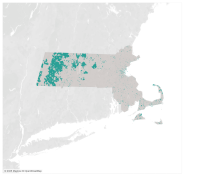
We’ve written a lot over the last half year about communities around the country that have built fixed wireless networks to bridge the digital divide. Most recently, we’ve seen approaches which look to tackle particular inequalities that fast, affordable Internet access can help to alleviate: in Providence, Rhode Island, for instance, nonprofit One Neighborhood Builders built a network to tackle health disparities among Olneyville residents.
Today we’re covering a project in Pittsburgh that confronts another aspect of the digital divide laid bare by the pandemic: communities where connectivity options exist and low-income programs like Comcast’s Internet Essentials are available, but the minimum speeds offered are insufficient for households where multiple users need to work and attend school simultaneously. In a world where upload speed remains just as important as download speed, asymmetrical 25/3Mbps (Megabits per second) connections don’t cut it anymore.

This is the problem that Every1online — a joint project by nonprofit Meta Mesh, Carnegie Mellon University, the University of Pittsburgh, two school districts, another nonprofit, and an array of local stakeholders — is looking to solve to get more than 450 families with students connected. They’ve built a fixed wireless system offering free connectivity to families across the Homewood neighborhood in Pittsburgh as well as nearby New Kensington and Coraopolis via 50/25 Mbps connections in a pilot program that will run for the next year. It’s a move that acknowledges that providing low-cost Internet access pegged at the lowest possible bandwidth tier disproportionately impacts vulnerable communities already living under the weight of a host of structural disadvantages.
Much of the greater Pittsburgh area has access to one or more wireline providers. But the city also suffers from a wealth gap for a large chunk of the population, centered on families of color (the Homewood neighborhood in particular). While low-income options exist, they aren’t fast enough for entire households which have been forced to shelter in place during the ongoing Covid-19 pandemic.
From Atop a Cathedral
Every1online began back in May, when Carnegie Mellon University (CMU) partnered with area nonprofit Meta Mesh to study the problem and secure a grant to pay for a pilot project. The University of Pittsburgh joined the group along with community leaders and stakeholders, including the Homewood Children’s Village and school districts in each neighborhood. Ultimately, a fixed wireless solution was settled upon.
A $105,000 grant from the RK Mellon Foundation kicked the project into gear, with an additional $200,000 donated by Carnegie Mellon’s CS Pathways program in the School of Computer Science. The group originally thought they were going to have to construct at least three towers to make the project work, but by placing hardware on existing buildings with the right height they’ve been able to avoid this entirely and cut costs dramatically.
Every1online consists of one super node, three repeater nodes, and access points placed on each participating residence. The super node sits on the top of 535-foot tall Cathedral of Learning on the University of Pittsburgh campus, and is connected to fiber backhaul provided by nonprofit corporation Keystone Initiative for Network Based Education and Research (KINBER). It sends a 5Ghz signal to three additional nodes: one on a water tower, one on an AM radio tower, and one on a conveniently located a utility pole that the group extended a few feet higher to meet their needs. Meta Mesh worked to broker community partnerships, set up meetings to determine need and find stakeholders to work with, and design the network. It will also own all hardware assets and serve as network operator.
Homewood, New Kensington, and Coraopolis were chosen based on a handful of criteria. Carnegie Mellon had been in preliminary conversations with the school district in Coraopolis to find a solution in the early days of the pandemic, so that neighborhood served as the fulcrum for the original grant. Homewood, with the largest economic and connectivity disparities in the area, was an obvious candidate. The project partners also used data from local stakeholders as well as school districts to identify families who could benefit.

Compared to Pittsburgh at large, each of the three faces particular challenges. While 80% of Pittsburgh households have a home computer with a broadband subscription, just 52% of those in Homewood, 71% of those in New Kensington, and 76% of those in Coraopolis do. Almost a third of Homewood households don’t have a home computer at all — three times higher than the rest of the city on average. The picture is also fraught for those under 18 years old in Homewood and New Kensington, with significant gaps compared to the surrounding area (see table).
To live and work in today’s digital society, it is essential to have access to the Internet. Reliable Internet access is no longer a luxury – it is a necessity and a right. Unfortunately, many people in our own City of Pittsburgh cannot afford the Internet services they need. Every1online is a one way to begin to see Internet access as a human right — Adam Longwill, Executive Director of Meta Mesh Wireless Communities
Design and Deployment

Access points and on-premises hardware for Every1online comes from Ubiquiti. Small, 24-volt ethernet-powered receivers are mounted on the outside of premises (including single-family homes and all flavors of multi-dwelling units (MDUs)) and connected to interior wireless routers providing access in each home. The network only requires one receiver on each building. Installation began in the middle of October, with the home install phase currently live and ongoing. The network is designed to handle at least three quarters of all participating households concurrently, and while the project originally set a goal of 25/10 Mbps (Megabits per second) connections for each residence, it has since raised the bar to 50/25Mbps (See coverage maps of each area). Achieving these speed tiers is the crux of the project's success, so that families can live, learn, and work remotely instead of staggering their screen time to avoid overloading their connection. The typical U.S. household has five devices and 20% have ten or more; Zoom recommends at least 1.5 Mbps of bandwidth in both directions to participate in 720p (less than HD) video conferencing, which jumps to 25/3 Mbps at high definition. At these requirements, the upload side of a 25/3 Mbps connection quickly gets overwhelmed.
Families who have self identified as unable to continue to pay for existing service, establish new service, or said that the bandwidth tier they can afford isn’t fast enough for the work they need all qualify for the pilot, and will receive one year of free connectivity. A lot of them, according to Samantha Garfinkel from Meta Mesh, are households currently subscribing to Comcast’s Internet Essentials. The project requires no proof of need or participation in an existing low-income Internet access program, which eliminates another barrier to entry for families in need. Once online, connections are open to the entire family.
The cities of Arnold and New Kensington have faced significant struggles with the loss of its primary industry, but there is a great deal of hope and potential to be found within the community. I see the Every1online initiative as a sustainable piece of a broader community system that provides it members opportunities to become productive contributors to ongoing growth and success. — Jon Banko, Acting Superintendent of New Kensington-Arnold School District
The project captures Meta Mesh’s approach in the long term, which is to work with school districts and other nonprofits to find similar bulk solutions to connectivity problems. Rather than operate as an Internet Service Provider (ISP) working with individual homes, the plan is to work through community organizations, school districts, and other local entities and provide low-cost, reliable, sufficiently fast bulk contracts to target neighborhoods in need. It’s a difference from handing out hotspots (which can be the quickest, easiest, and sometimes necessary solution to getting students online fast) to investing in locally-owned infrastructure which will provide low-cost solutions for years in the future.
Overcoming Obstacles and Planning for the Future
The project has overcome its share of obstacles. The zoning process was slow, with the Cathedral of Learning serving as a bottleneck because of its classification as a historically significant structure. Both the Chancellor of the University of Pittsburgh and President of Carnegie Mellon have helped expedite the process. Meta Mesh cites as particularly important to the pilot’s success (and future feasibility) their ability to meet communities where they are, according to their own needs, and spend time establishing a genuine dialogue. With long-term plans to continue this work in Pittsburgh after the pilot ends, establishing a history with local stakeholders as a trusted partner is key.
When the pilot ends after its first year, Every1online will remain in place and school districts will have the option to continue to purchase connections for families in those neighborhoods. Families that decide not to participate any longer will simple return the hardware, but Meta Mesh hopes that offering bulk access via these school districts will serve as a useful alternative as well as strengthen community ties. As it currently stands, Meta Mesh isn’t restricting the network to students only, but leaving it open to the household. It’s possible, depending on district desires and the contracts reached after the pilot project ends, that that could change.
Meta Mesh’s "Wi-Fi Wagon" is driving around checking signal strength through the holiday as progress continues, and should things continue to go well project leaders are looking at future expansion to the Hill District and the Sto-Rox School District.
While low-income programs like Internet Essentials have proven crucial to getting hundreds of thousands of families connected at an affordable rate, they also represent a commitment to a framework where speed of access isn't dependent upon household income. Whether or not we find ourselves in the midst of a pandemic, it's time to realize that such an approach is inherently inequitable and unworkable for many. Every1online breaks that mold.
Thanks to Michelle Andrews for providing broadband and demographic analyses and data on Homewood, Coraopolis, and New Kensington.
Headxer photo by Lee Paxton via Wikimedia Commons, licensed under the Creative Commons Attribution-Share Alike 4.0






